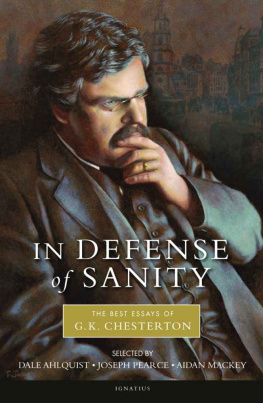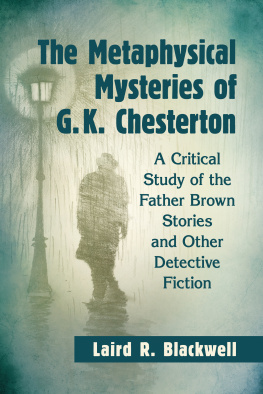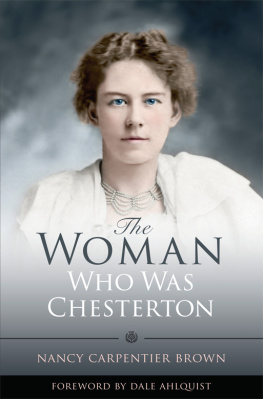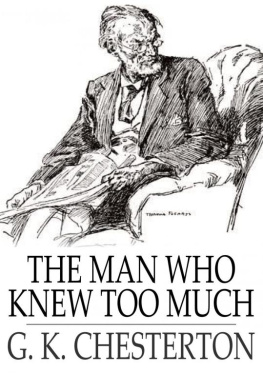Gilbert Chesterton - The Innocence of Father Brown
Here you can read online Gilbert Chesterton - The Innocence of Father Brown full text of the book (entire story) in english for free. Download pdf and epub, get meaning, cover and reviews about this ebook. genre: Detective and thriller. Description of the work, (preface) as well as reviews are available. Best literature library LitArk.com created for fans of good reading and offers a wide selection of genres:
Romance novel
Science fiction
Adventure
Detective
Science
History
Home and family
Prose
Art
Politics
Computer
Non-fiction
Religion
Business
Children
Humor
Choose a favorite category and find really read worthwhile books. Enjoy immersion in the world of imagination, feel the emotions of the characters or learn something new for yourself, make an fascinating discovery.

- Book:The Innocence of Father Brown
- Author:
- Genre:
- Rating:4 / 5
- Favourites:Add to favourites
- Your mark:
- 80
- 1
- 2
- 3
- 4
- 5
The Innocence of Father Brown: summary, description and annotation
We offer to read an annotation, description, summary or preface (depends on what the author of the book "The Innocence of Father Brown" wrote himself). If you haven't found the necessary information about the book — write in the comments, we will try to find it.
The Innocence of Father Brown — read online for free the complete book (whole text) full work
Below is the text of the book, divided by pages. System saving the place of the last page read, allows you to conveniently read the book "The Innocence of Father Brown" online for free, without having to search again every time where you left off. Put a bookmark, and you can go to the page where you finished reading at any time.
Font size:
Interval:
Bookmark:
The Innocence of Father Brown
by G. K. Chesterton
The Blue Cross
Between the silver ribbon of morning and the green glittering ribbon of sea, the boat touched Harwich and let loose a swarm of folk like flies, among whom the man we must follow was by no means conspicuous-nor wished to be. There was nothing notable about him, except a slight contrast between the holiday gaiety of his clothes and the official gravity of his face. His clothes included a slight, pale grey jacket, a white waistcoat, and a silver straw hat with a grey-blue ribbon. His lean face was dark by contrast, and ended in a curt black beard that looked Spanish and suggested an Elizabethan ruff. He was smoking a cigarette with the seriousness of an idler. There was nothing about him to indicate the fact that the grey jacket covered a loaded revolver, that the white waistcoat covered a police card, or that the straw hat covered one of the most powerful intellects in Europe. For this was Valentin himself, the head of the Paris police and the most famous investigator of the world; and he was coming from Brussels to London to make the greatest arrest of the century.
Flambeau was in England. The police of three countries had tracked the great criminal at last from Ghent to Brussels, from Brussels to the Hook of Holland; and it was conjectured that he would take some advantage of the unfamiliarity and confusion of the Eucharistic Congress, then taking place in London. Probably he would travel as some minor clerk or secretary connected with it; but, of course, Valentin could not be certain; nobody could be certain about Flambeau.
It is many years now since this colossus of crime suddenly ceased keeping the world in a turmoil; and when he ceased, as they said after the death of Roland, there was a great quiet upon the earth. But in his best days (I mean, of course, his worst) Flambeau was a figure as statuesque and international as the Kaiser. Almost every morning the daily paper announced that he had escaped the consequences of one extraordinary crime by committing another. He was a Gascon of gigantic stature and bodily daring; and the wildest tales were told of his outbursts of athletic humour; how he turned the juge d'instruction upside down and stood him on his head, "to clear his mind"; how he ran down the Rue de Rivoli with a policeman under each arm. It is due to him to say that his fantastic physical strength was generally employed in such bloodless though undignified scenes; his real crimes were chiefly those of ingenious and wholesale robbery. But each of his thefts was almost a new sin, and would make a story by itself. It was he who ran the great Tyrolean Dairy Company in London, with no dairies, no cows, no carts, no milk, but with some thousand subscribers. These he served by the simple operation of moving the little milk cans outside people's doors to the doors of his own customers. It was he who had kept up an unaccountable and close correspondence with a young lady whose whole letter-bag was intercepted, by the extraordinary trick of photographing his messages infinitesimally small upon the slides of a microscope. A sweeping simplicity, however, marked many of his experiments. It is said that he once repainted all the numbers in a street in the dead of night merely to divert one traveller into a trap. It is quite certain that he invented a portable pillar-box, which he put up at corners in quiet suburbs on the chance of strangers dropping postal orders into it. Lastly, he was known to be a startling acrobat; despite his huge figure, he could leap like a grasshopper and melt into the tree-tops like a monkey. Hence the great Valentin, when he set out to find Flambeau, was perfectly aware that his adventures would not end when he had found him.
But how was he to find him? On this the great Valentin's ideas were still in process of settlement.
There was one thing which Flambeau, with all his dexterity of disguise, could not cover, and that was his singular height. If Valentin's quick eye had caught a tall apple-woman, a tall grenadier, or even a tolerably tall duchess, he might have arrested them on the spot. But all along his train there was nobody that could be a disguised Flambeau, any more than a cat could be a disguised giraffe. About the people on the boat he had already satisfied himself; and the people picked up at Harwich or on the journey limited themselves with certainty to six. There was a short railway official travelling up to the terminus, three fairly short market gardeners picked up two stations afterwards, one very short widow lady going up from a small Essex town, and a very short Roman Catholic priest going up from a small Essex village. When it came to the last case, Valentin gave it up and almost laughed. The little priest was so much the essence of those Eastern flats; he had a face as round and dull as a Norfolk dumpling; he had eyes as empty as the North Sea; he had several brown paper parcels, which he was quite incapable of collecting. The Eucharistic Congress had doubtless sucked out of their local stagnation many such creatures, blind and helpless, like moles disinterred. Valentin was a sceptic in the severe style of France, and could have no love for priests. But he could have pity for them, and this one might have provoked pity in anybody. He had a large, shabby umbrella, which constantly fell on the floor. He did not seem to know which was the right end of his return ticket. He explained with a moon-calf simplicity to everybody in the carriage that he had to be careful, because he had something made of real silver "with blue stones" in one of his brown-paper parcels. His quaint blending of Essex flatness with saintly simplicity continuously amused the Frenchman till the priest arrived (somehow) at Tottenham with all his parcels, and came back for his umbrella. When he did the last, Valentin even had the good nature to warn him not to take care of the silver by telling everybody about it. But to whomever he talked, Valentin kept his eye open for someone else; he looked out steadily for anyone, rich or poor, male or female, who was well up to six feet; for Flambeau was four inches above it.
He alighted at Liverpool Street, however, quite conscientiously secure that he had not missed the criminal so far. He then went to Scotland Yard to regularise his position and arrange for help in case of need; he then lit another cigarette and went for a long stroll in the streets of London. As he was walking in the streets and squares beyond Victoria, he paused suddenly and stood. It was a quaint, quiet square, very typical of London, full of an accidental stillness. The tall, flat houses round looked at once prosperous and uninhabited; the square of shrubbery in the centre looked as deserted as a green Pacific islet. One of the four sides was much higher than the rest, like a dais; and the line of this side was broken by one of London's admirable accidents-a restaurant that looked as if it had strayed from Soho. It was an unreasonably attractive object, with dwarf plants in pots and long, striped blinds of lemon yellow and white. It stood specially high above the street, and in the usual patchwork way of London, a flight of steps from the street ran up to meet the front door almost as a fire-escape might run up to a first-floor window. Valentin stood and smoked in front of the yellow-white blinds and considered them long.
The most incredible thing about miracles is that they happen. A few clouds in heaven do come together into the staring shape of one human eye. A tree does stand up in the landscape of a doubtful journey in the exact and elaborate shape of a note of interrogation. I have seen both these things myself within the last few days. Nelson does die in the instant of victory; and a man named Williams does quite accidentally murder a man named Williamson; it sounds like a sort of infanticide. In short, there is in life an element of elfin coincidence which people reckoning on the prosaic may perpetually miss. As it has been well expressed in the paradox of Poe, wisdom should reckon on the unforeseen.
Font size:
Interval:
Bookmark:
Similar books «The Innocence of Father Brown»
Look at similar books to The Innocence of Father Brown. We have selected literature similar in name and meaning in the hope of providing readers with more options to find new, interesting, not yet read works.
Discussion, reviews of the book The Innocence of Father Brown and just readers' own opinions. Leave your comments, write what you think about the work, its meaning or the main characters. Specify what exactly you liked and what you didn't like, and why you think so.






